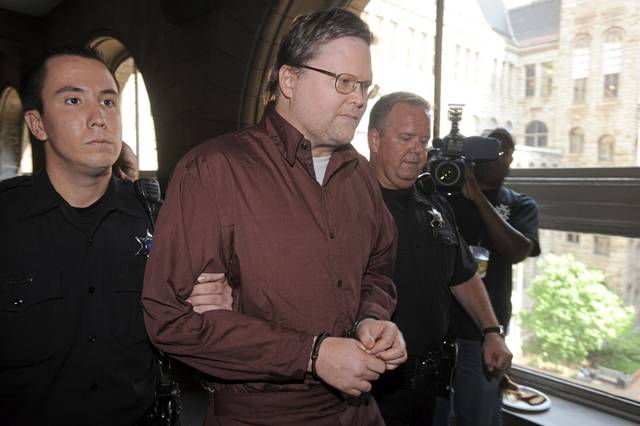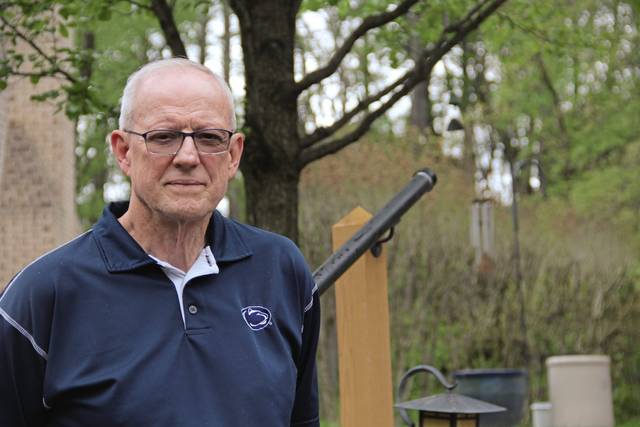Twenty years ago this month, a jury in Western Pennsylvania had an important question to answer: should Richard Baumhammers be put to death for what he did?
“Sentencing someone to death, that’s not an easy decision,” said Ron Frew on a recent rainy day in May. Frew, 67, lives in the same Monroeville home he did when he was called to serve as jury foreman for the Baumhammers trial.
On April 28, 2000, Baumhammers went on a killing rampage, starting with his neighbor in Mt. Lebanon and ending in Beaver County. His attack left five people dead and one paralyzed. The injured man, Sandeep Patel, died nearly seven years later, in 2007, at the age of 32.
As jury foreman, Frew handed down the death penalty on May 11, 2001, in Allegheny County Common Pleas Judge Jeffrey Manning’s courtroom.
Baumhammers, who was 34 at the time of the murders, is 55 and remains on death row.
Baumhammers killed his neighbor, who was Jewish, and attacked two synagogues. He went on to target people at an Indian grocer, a Chinese restaurant and a karate center; his victims were Indian, Chinese, Vietnamese and Black.
Frew remembers a lot about the case, and disturbs him to this day, he said.
He remembers being one of the 60-person pool for jury selection, which started on a Wednesday and finished after five days. He remembers the monotony of being sequestered for 23 days in the Omni William Penn Hotel. He remembers the long days in court — the 13 days of argument, the piles of evidence, the emotions. He remembers what he felt as he delivered the guilty verdict.
When he stood up to read each charge and the “guilty” verdict, Frew was anxious, he said. After all that time, he was “on edge.”
“I didn’t want to make any mistakes,” he said about reading each charge. But then Frew remembers calming down.
“His knees were shaking,” Frew said of Baumhammers, who also stood not too far away from him in the silent courtroom. “When I saw that he was also nervous, it calmed me right down. I felt much better. Seeing him like that enabled me to calm down and get through the whole thing without any more anxiety.”
Two days later, after a few hours of deliberating, the jury reached its unanimous decision: death by lethal injection.
“I and the jury felt it was appropriate in this case,” Frew said. After delivering the weighty decision, Frew said he felt an overwhelming sense of relief. It was over.
“But I certainly don’t want to say I’m proud of it,” he said. “We sentenced someone to death. That’s not something to boast about.”
Frew describes himself as a God-fearing man who believes there are certain things humans are put on Earth to do in order to fulfill a bigger plan. His time on the jury for the Baumhammers case was one of those things.
But 20 years later, he is still disturbed. It isn’t over.
Frew said the fact that Baumhammers is still alive, along with another 114 inmates on death row in Pennsylvania, reveals a flawed justice system.
“The only way a punishment is to serve as a deterrent is if it’s carried out,” he said. “Punishments should be worse than the crime. That’s the way you keep people from doing things.”
There have been no executions in Pennsylvania since 1999, and only three since 1976.
Gov. Tom Wolf placed a moratorium on Pennsylvania’s death penalty in 2015. According to the American Bar Association, the moratorium will last “at least until he receives recommendations from the bipartisan Pennsylvania Task Force and Advisory Committee on Capital Punishment,” which is investigating the state’s death penalty process.
Barry Kramer, police chief of Center Township in Beaver County, has been waiting six years for a response to a letter he wrote Wolf arguing for the reversal of the state’s moratorium on the death penalty.
“We believe that we must clearly demonstrate to society that murder is an intolerable crime that will be appropriately punished,” Kramer wrote the governor in 2015. He re-sent a similar letter in 2016, he said, and still awaits a response.
Elizabeth Rementer, the governor’s deputy press secretary, said a person’s road to justice doesn’t end once on death row.
“Mr. Baumhammers’ actions were horrific, and the governor thanks the members of the jury for their careful deliberation and verdict in this case,” she said in an email.
“In fact, it can extend a long time and take many detours. Mr. Baumhammers’ case is an example of this, as his case is still going through the appellate process after two decades. Governor Wolf issues temporary reprieves if a warrant reaches his desk without further appeals, and we are not yet at that point in this case,” Rementer said.
Since being sentenced to death by lethal injection, Baumhammers has appealed the five murder charges to the state’s highest court. In his appeals, he claimed his lawyers were ineffective during his trial for the slayings, where he argued insanity and claimed he hallucinated during the two-hour spree.
All of Baumhammers’ appeals have been denied. However, court records show Baumhammers continues to dispute the legal basis for confinement through habeas corpus proceedings. He is imprisoned at SCI Phoenix, which holds all of the state’s 115 men on death row.
Rementer said the governor’s action on capital punishment “is not out of sympathy for the convicted.”
Instead, she said Wolf wants an examination of “the drawn out and flawed capital punishment system.”
“The governor expresses his sincerest condolences to the victims’ loved ones, as that tragic loss is still very real even two decades later. Their pain is unfathomable. Thankfully, this murderer was caught, tried and convicted and the public is safer with him behind bars. The justice system is not perfect, but it is keeping dangerous individuals like Mr. Baumhammers away from the public,” Rementer said.
Kramer says that’s not good enough.
“I just don’t understand (Wolf’s) rationale,” Kramer said.
The police chief said he is frustrated that Baumhammers, whom he described as undoubtedly guilty, continues to prevent closure for him, the victims’ families and the jury.
“Being a jury member is a civic duty – and it’s an important duty. It’s an important job, and they did it. But the governor won’t accept it,” Kramer said.
Knowing what he knows now about the death penalty in Pennsylvania, Frew said the jury might have just sentenced him to life in prison, where he would have spent more of his time among general population and “probably would have been killed there.”
“We sentenced him to die, not serve his time in prison,” Frew said.











